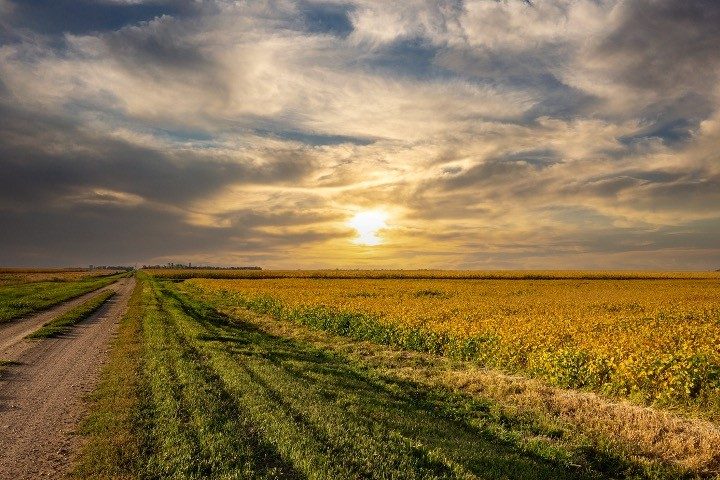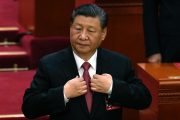
Panicked by the possibility of America First policies being enacted at the state level, the establishment is quickly unleashing its resources to preserve the selling out of the country.
Specifically, several industry representatives and special interests have united in opposition to a proposal from South Dakota’s Republican Gov. Kristi Noem, who seeks to reduce the ability of Communist China and other foreign actors to buy up land in her state.
Per information obtained by Breitbart News, one of the special interests hoping to block Noem-backed legislation consists of “agricultural groups.” Brenda Forman of the South Dakota Association of Cooperatives wrote to Noem’s legal team this month, asserting that they “are deeply concerned about the legality and constitutionality of the proposal.”
“We remain interested in identifying what is not working with our current law,” Forman added in the email.
Breitbart notes the long list of groups who consented to that message:
But the email ends with a list of the groups Forman says are concerned about the Noem proposal, including SD Farm Bureau, SD Farmer Union, SD AgriBusiness Association, SD Cattlemen’s Association, SD Corn Grower Association, SD Dairy Producers, SD Pork Producers, SD Soybean Association, SD Stockgrowers Association, SD Wheat Growers Association, and the SD Association of Conservation Districts, in addition to her SD Association of Cooperatives.
In a press release last month, Noem announced her proposal to create a state version of the federal Committee on Foreign Investment in the United States (CFIUS), which would be known as CFIUS-South Dakota and would reserve the power to review and block foreign entities from making land purchases in the Mount Rushmore State.
“With this new process, we will be able to prevent nations who hate us — like Communist China — from buying up our state’s agriculture land,” Noem said at the time. “We cannot allow the Chinese Communist Party to continue to buy up our nation’s food supply, so South Dakota will lead the charge on this vital national security issue.”
The release detailed the manner in which the committee would be organized:
The CFIUS-SD board would be made up of three ex officio members: the Governor’s General Counsel (who would serve as board chair), the Secretary of the Department of Agriculture and Natural Resources, and the Director of the South Dakota Office of Homeland Security (part of the South Dakota Department of Public Safety). The board would also include two governor’s appointees: an agricultural industry expert who owns at least 160 acres of agricultural land in SD, and a national and/or state security or foreign policy expert.
In order to become law this year, Noem’s plan must be taken up within the short window prior to the beginning of the legislative session, which starts in March.
The idea has become popular in Republican circles. Gov. Greg Abbott of Texas has signaled support for similar legislation in his state. And President Donald Trump has included in his 2024 platform a measure to ban China from purchasing American farmland.
Florida Republican Gov. Ron DeSantis reportedly wants to stop the CCP from purchasing property in the Sunshine State.
“If you look at the Chinese Communist Party, they’ve been very active throughout the Western Hemisphere in gobbling up land,” DeSantis has said. “That is not in the best interests of Florida to have the Chinese Communist Party owning farmland, owning land close to military bases.”
This isn’t the first time Noem has sought to curtail China’s influence on her state. She was the first Republican governor to push for a ban of the Chinese app TikTok on state devices, and other GOP elected officials have since followed her lead.
In Texas, for instance, not only has the app been prohibited on state devices for about a month, but major state universities are now also banning access to TikTok on school internet.
“TikTok harvests vast amounts of data from its users’ devices — including when, where, and how they conduct Internet activity — and offers this trove of potentially sensitive information to the Chinese government,” Abbott declared in a statement last month.
The FBI has highlighted TikTok’s parent company, ByteDance Ltd, as problematic due to its close ties to the Chinese government. The concern of U.S. policymakers is that Beijing could use the app to collect the user data of American citizens.
The New American has extensively covered the CCP’s efforts to influence U.S. agricultural policy. These efforts include the work of a Chinese Communist Party influence group with ties to Microsoft founder Bill Gates, which helped organize an event designed to convince U.S. government officials to partner with China on American agriculture.
The news broke at approximately the same time that Gates became the country’s biggest private owner of farmland.
China has been gaining ground in purchasing American real estate, land, farms, and food-production plants. Twelve Chinese investors have put $16 million into an aquaculture project on 100 acres in Fellsmere, Florida.
In Virginia, the Chinese bought Smithfield Foods and its 460 large farms and facilities in 26 states, employing tens of thousands of Americans.
China and Bill Gates aren’t the only ones striving to buy up lan d. Mark Zuckerberg, the founder and CEO of Facebook, has been purchasing land in Hawaii. A $17 million, 110-acre purchase in December of 2021 includes most of a reservoir that flooded in 2006.
Policies like those advanced by Noem in South Dakota are long overdue. Considering everything at stake in this issue, it’s not surprising that the establishment is prepared to pull out all the stops to stop the legislation from passing.
For organizations that claim to have the best interests of American farmers at heart, these establishment-funded groups are certainly eager to see our land sold out to the highest foreign bidder.




